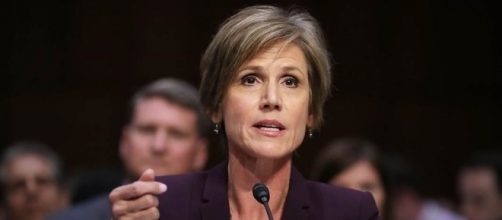Former US Attorney General Sally Yates testified in front of the Senate as part of a parliamentary investigation into possible cooperation between Donald Trump's electoral staff and Russian intervention in the US election. Yates testified that she warned Don McGhan's White House advisor that Trump's National Security Advisor, Michael Flynn, had come up with "troublesome" procedures regarding his telephone conversations with Russian ambassador Sergei Kislyak and lamented Vice President Mike Pence, the Washington Post says.
Yates was fired after warning the White House
Yates was removed on January 30, just three days after warning the White House about Flynn lying about the content of his conversation with Kislyak. The content of the talks were the sanctions imposed by the United States on Russia and the possibility of their abolition if Trump comes to power.
This conclusion is supported by the time of the conversation. On December 29, 2016, the same day that former President Barack Obama ordered the expulsion of 35 Russian diplomatic officials and further measures due to Russian hacking of documents related to Hillary Clinton and interference in the elections. Flynn resigned on February 13 because of lying to Pence, but only after media discovered this scandal, and more than two weeks after Yates warned the White House.
In other words, instead of releasing his incriminating adviser to Flynn, Trump dismissed The State attorney warning him of the affair.
That Trump is very concerned about Yates's testimony and intends to discredit her as an unreliable witness suggested his tweet.
Ask Sally Yates, under oath, if she knows how classified information got into the newspapers soon after she explained it to W.H. Counsel.
— Donald J. Trump (@realDonaldTrump) May 8, 2017
Serious disturbance of national security
Trump's shift from the affair to the question of how the affair data "spurned" is similar to the accusation that Obama was eavesdropping him. Although FBI director James Comey testified that there is no evidence for that, Trump continues to argue that the charge is "very robustly proven".
But, according to Yates, the case with Flynn is a serious disturbance of national security, because he brought himself in a situation in which Russians can blackmail him because of his talks with Kislyak. The investigation remains to find out why the Trump administration waited two weeks to settle an advisor caught in secret agreements with the Russians - and why did it do so only after pressures from the media and the public.


